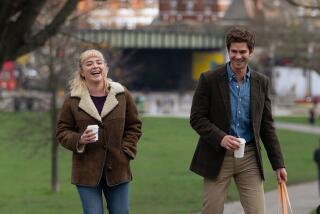Sex, lies and artists
- Share via
Alma Mahler is slipping. Wife and lover of great composers, writers, artists, architects, she now attracts lesser creative types. An embarrassing biopic, “Bride of the Wind,” was released to little acclaim a few years ago. And today, 40 years after her death, there is “Alma,” the “polydrama.”
“Alma” is an ambitious attempt to mix vigorous voyeurism with dinner theater. We’re invited to Alma’s 125th birthday party in a haunted space. We’re served skewers of bad cheese and given something to drink. Alma’s matronly ghost introduces three versions of her younger self. One is the true Alma, but which? That is to be the evening’s mystery.
Then for four hours we wander. Alma’s life is played out in different rooms. Scenes occur simultaneously. We go where we like. We follow Mahler, Alma’s first husband, if we want to, although he spends a lot of time in solitary musing. Those with a taste for an evening’s harangue can hang out with Alma’s ghost. A better bet is to head for the bedrooms and catch the sex scenes with one of the young Almas and this or that artist.
Intermission is a sit-down dinner -- a Viennese buffet. You can’t escape it -- or its smells. You make your own play, but fish odors downstairs, urine on the outdoor banisters may influence your choices. “This is theatre that smells of life itself!” the program exclaims.
The haunted space is the Los Angeles Theatre, the once-ornate movie palace downtown, which is now in an interesting state of disrepair. Though its grandeur has long faded into depressing decay, it interior remains curiously beguiling. Alma can’t possibly be its only ghost.
You make your own play, but you are also its prisoner. That is the very odd experience of “Alma,” which was written by the Israeli playwright Joshua Sobel (of “Jerusalem Syndrome” fame) and directed by Paulus Manker. There is life going on everywhere in this production, which was imported from Vienna. Life is going on in this theater. But it always seems to slip away. As you keep running around the theater, seeking its secrets, seeking Alma’s secrets, paths become circular and so do scenes. It’s a long evening, and it can begin to feel as though there is no exit.
Born Alma Maria Schindler in 1879, Alma was an artist turn-on in turn-of-the-century Vienna. A composer of modest talent, she caught the eye of the young composer Alexander Zemlinsky, Schoenberg’s teacher, and the older painter Gustav Klimt. But her real prize was Gustav Mahler, 20 years her senior, whom she married. She had affairs with architect Walter Gropius (which drove Mahler to see Freud) and Mahler’s doctor. After Mahler’s death in 1911, she had a torrid relationship with the painter Oskar Kokoschka but married Gropius. After divorcing Gropius, she married the writer Franz Werfel, author of “The Song of Bernadette.”
It’s good to know a bit of this before embarking on “Alma,” but not entirely necessary. The three young Almas (Ryan Templeton, Tiffany Elle and Maria Vargo) sing a cabaret number to set the scene.
I witnessed Klimt (Robert Branco) unsuccessfully try to get Alma into bed upstairs and Dr. Frankel use exactly the same lines (and she the same response) in a sanitarium downstairs. In the lobby, Mahler forced a tearful Alma to give up music. I missed a bus ride around the block (Alma and Werfel in Palestine) but caught its return in the alley, where a man sexually assaults her in a raw scene on the pavement.
Running upstairs she joined another Alma, in bed with Zemlinsky (Ruben Garcia). The two Almas try to figure each other out.
Mahler’s funeral is in the theater proper; a grand space filled with a recording of the Second Symphony blasted at ear-splitting volume.
Dinner.
War.
The second act includes World Wars I and II. There is lots of noise, lots of fog. Elaborate installations reproduce shelters and hospitals. The three Almas become a song and dance trio every so often. Dresses come off and go on. They delve into Alma’s soul. “Never throw a man away because you are through with him,” one says as the others sagely nod.In the main theater, Alma’s ghost has a mad scene. Ultimately we are all led to theater to witness Kokoschka lose it. Played by Manker in apparent competition with the mugging Flo Lawrence as Alma, he parades his madness, presiding over a surreal ceremony of tearing apart an Alma doll. Teresa (Bernadette Perez), his chambermaid, tries nudity as a distraction. It doesn’t work. Ravel’s “La Valse” blasts in the background.
One has to give credit to hard-working actors unfazed by an audience in their midst and sometimes acting for only a single witness, or maybe no one at all. The sets by Georg Resetschnig are installation art, museum worthy. But unlike other interesting work that has been done over the years using environmental spaces theatrically, “Alma” is more the art of the looky-loo.
Who, by the way, is the real Alma? Don’t worry, I won’t give it away. In fact, I can’t give it away. It’s never answered.
*
‘Alma’
*
Where: Los Angeles Theatre, 615 S. Broadway, L.A.
When: 7 p.m. Thursdays through Saturdays; 6 p.m. Sundays
Ends: Dec. 5
Price: $125 (includes buffet dinner)
Contact: (213) 688-2994
Running time: Four hours
More to Read
The biggest entertainment stories
Get our big stories about Hollywood, film, television, music, arts, culture and more right in your inbox as soon as they publish.
You may occasionally receive promotional content from the Los Angeles Times.











